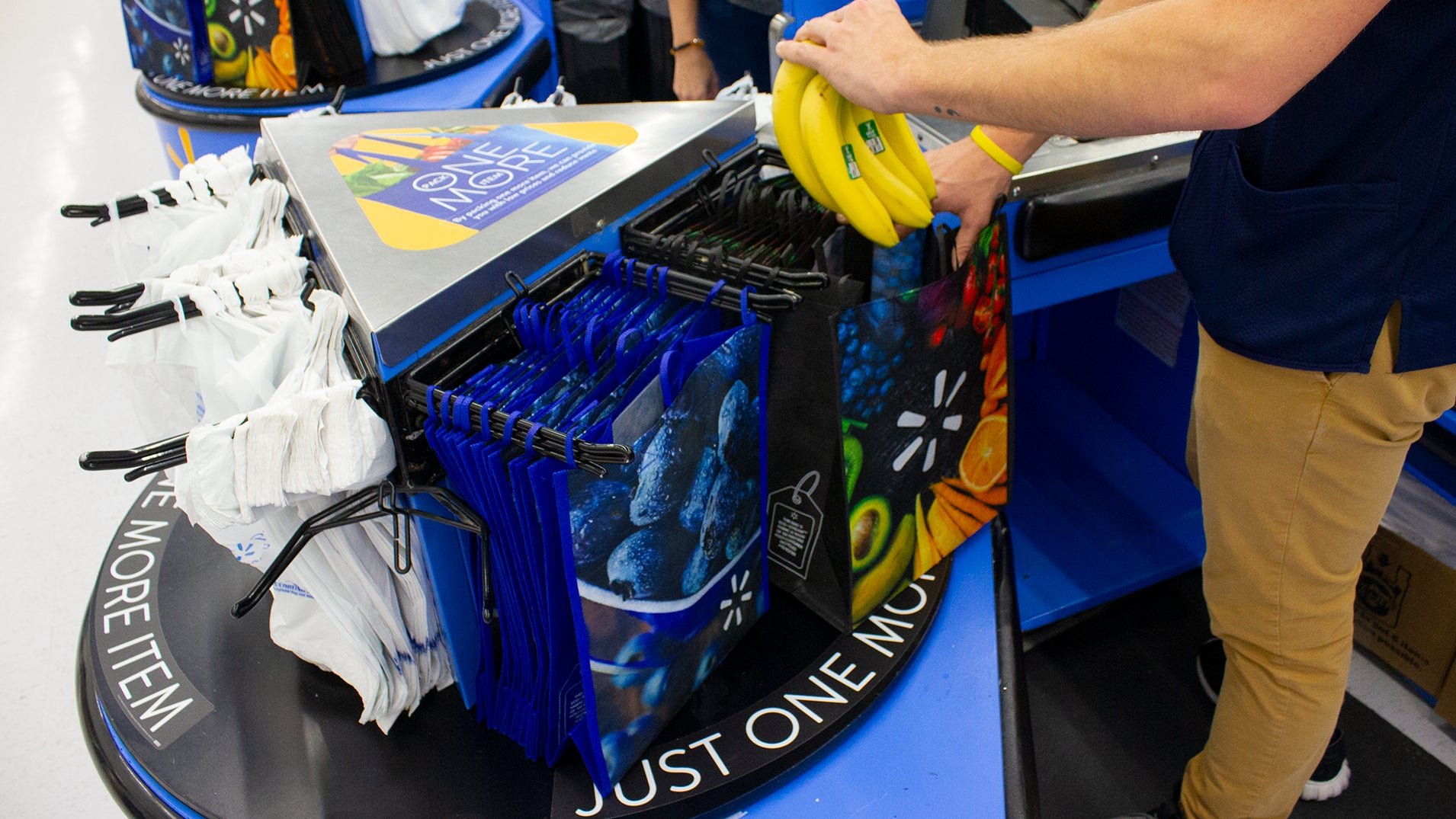Walmart will offer reusable plastic bags at cash registers. That’s nice I guess
Walmart announced Wednesday that it would begin offering reusable plastic bags made with recycled plastic fibers at cash registers, in an effort to move toward its sustainability goals. The reusable bags will cost $0.98, and Walmart will continue to offer customers single-use plastic bags for free.


Walmart announced Wednesday that it would begin offering reusable plastic bags made with recycled plastic fibers at cash registers, in an effort to move toward its sustainability goals. The reusable bags will cost $0.98, and Walmart will continue to offer customers single-use plastic bags for free.
That sounds good. But the reality is more complicated.
Reusable plastic bags, particularly those made from recycled material, are a decent replacement for single-use plastic bags. They can be used many times, and they use less water and other resources to make than, say, brand-new cotton totes. According to lifecycle analyses, making them also produces less greenhouse gas emissions than making a cotton tote or a paper bag.
That doesn’t make reusable plastic bags entirely “good.” No matter how much better a plastic bag might be when it comes to emissions or resource use, it still contributes to the global crisis of trash that lasts virtually forever. Making cotton or paper bags may use more water, but cotton and paper degrades. It does not, like plastic, enter the world’s oceans, stuff the guts of marine animals, and make its way into our food supply.
You have to hold both concepts in your mind at once. There is no “this is bad” and “this is good” answer—unless you’re pitting any single-use thing (bad!) against a reusable one (better!).
What’s more, it’s hard to say in absolute terms what the impact of any item in the global supply chain really is, especially when it comes to bags, which people use wildly differently and for wildly different amounts of time. Lifecycle analyses like this much-cited Denmark report from 2018 are based on a number of assumptions—primarily, they don’t take the impact of plastic litter into account. The Denmark report also assumes that two organic cotton totes would be needed to replace one plastic bag, because the organic cotton totes the researchers found in Denmark were generally smaller than single-use plastic bags. Yes, organic cotton uses more water and resources to grow than conventional cotton. But the assumption of using two bags instead of one is another reason that their estimate for the number of times you’d have to use an organic cotton tote in order to match the non-litter related environmental impact of using one single-use plastic bag is so enormous (20,000 times).
Plus, the number of necessary reuses depends on what you’re looking at. For cotton—both conventional and organic—the high numbers are due to the bag’s contribution to ozone depletion specifically, vs. the impact on the ozone of a plastic bag. You’ll get an entirely different number if you look only at climate change impacts apart from ozone depletion, or if you look only at freshwater depletion.
For example, the study concludes that a conventional cotton bag needs to be reused as many as 7,000 times to meet the same impact as a single-use plastic bag, but that high number is primarily due to ozone depletion. When just climate change impacts are taken into account, the needed reuses are more like 50. When it comes to freshwater depletion, the number is still fairly high—above 1,000 uses.
Lifecycle assessments, in other words, involve so many variables that it is really, really hard to make a good one. The Denmark report is the best we have right now, and it’s not even peer-reviewed! That’s how little research there is in this field right now.
At the end of the day, Walmart’s bag announcement stops short of being impressive mostly because it leaves the burden of choice on the consumer, whom they will charge $0.98 a pop for the privilege of helping Walmart achieve its sustainability goals.
The impact of your choices as an individual consumer—paper, plastic, or cotton—are infinitesimal in light of the scale of the problem. What can make a bigger dent, however, is how massive corporations like Walmart choose to stock their shelves and conduct their businesses. According to an analyst who spoke to Bloomberg, Walmart hands out about 20 billion single-use plastic bags to customers a year (Walmart declined to offer its own figure). Last year, just by shortening the length of its single-use plastic bags, Walmart saved itself $20 million a year, according to Bloomberg—and presumably cut down on plastic in the process. That’s an example of the scale we’re talking about here.
While Walmart’s decision to offer consumers a reusable bag is good, in a soft pat-on-the-head type way, it’s a baby step. A really, really small baby step. A decision more in line with the scale of the global problem would be for Walmart to end the use of single-use plastic bags in all stores, or even to make it more appealing for customers to bring their own bags by offering them a discount when they do so.
Walmart has publicized several other sustainability goals along with this bag announcement, like powering 50% of its stores with renewable energy by the end of 2025. The company has “completed contracts for 136 new solar and wind projects,” according to a press release, which will add 2.14 billion kilowatt hours of renewable energy to its supply a year.
Without doing an assessment, I’d guess that initiative will probably have a larger impact on the planet than a smattering of extremely optional reusable bags at the register. Wake me up when they remove single-use plastic bags from stores altogether.